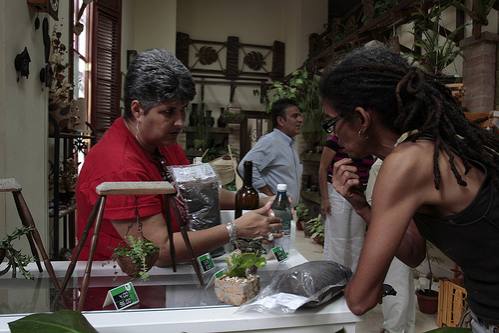A Green Needle in the Haystack of Cuban Small Enterprise

HAVANA, Nov 27 (IPS) - Oasis Nelva is a refreshing green space in the midst of the grey asphalt landscape of Old Havana. The ornamental plant shop is also one of only a handful of eco-friendly initiatives among the upsurge of private small businesses in Cuba.
"We have decided on an environmentally sustainable approach to get our business off the ground," one of the shop's owners, Carmen Monteagudo, told Tierramérica.*
Monteagudo, a specialist in local development strategies, and gardening expert Evelio Pérez have created a unique venture among the small businesses that have cropped up since 2010, when the government of Raúl Castro legalised new professional activities for the private sector.
This approach has helped them to avoid a number of obstacles. Among other factors, the development of the private sector has been hindered by an almost non-existent wholesale market for supplies, and because the activities permitted, which are small in number and highly specific, stifle creativity, according to a study published this year by economists Omar Everleny Pérez and Pavel Vidal.
"Everything we sell is made in Cuba, produced right here in the capital," explained Monteagudo, pointing to the flower pots, vases, hanging planters, stands, garden statues and other decorative plant accessories sold in the shop. "We also place special emphasis on recycling."
With their sights set on attracting both local customers and foreign tourists visiting Old Havana, Monteagudo and Pérez asked the craftspeople who supply the planters and other ornaments they sell to come up with original designs incorporating the reuse of waste materials.
This gave rise to planters crafted from carved coconut shells and lined with plastic bottles, or from wood recovered from the hoardings around construction sites, as well as vases created by a local craftswoman who has developed a formula to melt and reuse the crushed remains of collapsed masonry.
Environmentally friendly business management is rare among the 391,500 self-employed workers registered in 2011 by the Cuban government's National Office of Statistics.
Monteagudo and Pérez do not know of any other private entrepreneurs who apply the tenets of sustainability. "More awareness raising and training are needed. This is also a very young sector," commented Monteagudo, who is a member of the non-governmental Community Initiatives Exchange and Reference Centre.
For them, Oasis Nelva is an opportunity to put their skills and a lifelong obsession to concrete use. In November 2011, the Office of the Historian of the City of Havana offered them the chance to participate in a special project for small businesses that would benefit the community of the historic old quarter of Havana.
The offer included the possibility of leasing renovated shop premises and of offering courses. In the loft overlooking the shop, a workshop-classroom will be set up for training in urban quality of life and sustainability, as well as classes in bonsai cultivation and flower arranging, in order to "spread the ecological vision," said Pérez.
Oasis Nelva has price lists in the two currencies that circulate in the country, the Cuban peso and the convertible peso or CUC.
The plants are supplied by the national network of urban and suburban agriculture nurseries and gardens coordinated by the state-run Alejandro de Humboldt Institute of Basic Research in Tropical Agriculture, which produce food, plants and seedlings with 100% organic methods.
"We get our stock from a number of these nurseries and from my rooftop," which is where he raises his bonsai trees, said Pérez. All of the plants sold in the shop are grown and cared for with purely organic, non-chemical products.
The shop also sells Cuban-made biofertilisers, such as Ecofel, which are the top-selling products, according to sales clerk Nercys Pérez.
"If we could get hold of a nearby vacant lot, we could set up a nursery where we would use rainwater and make optimum use of the soil," said Monteagudo. In the meantime, tubes connected to the two air-conditioning units carry the water that leaks out of them into storage tanks. "This guarantees a supply of water and keeps costs down," she explained.
Most of the 181 professional activities legalised for the private sector "are not very knowledge-intensive," noted Everleny Pérez and Vidal in their study on the expansion of self-employment and microenterprise as key elements of the country's economic restructuring.
The options available, largely limited to basic services like transportation, accommodation and the food industry, are not particularly appealing to Cuban professionals, they added.
This is why they recommend further expanding private sector alternatives to attract the more than one million workers who will lose their jobs in the public sector by 2015. Many private small businesses are already microenterprises, as they are permitted to hire staff, rent state-owned premises, and receive bank loans.
* This story was originally published by Latin American newspapers that are part of the Tierramérica network. Tierramérica is a specialised news service produced by IPS with the backing of the United Nations Development Programme, United Nations Environment Programme and the World Bank.
© Inter Press Service (2012) — All Rights ReservedOriginal source: Inter Press Service
 Global Issues
Global Issues